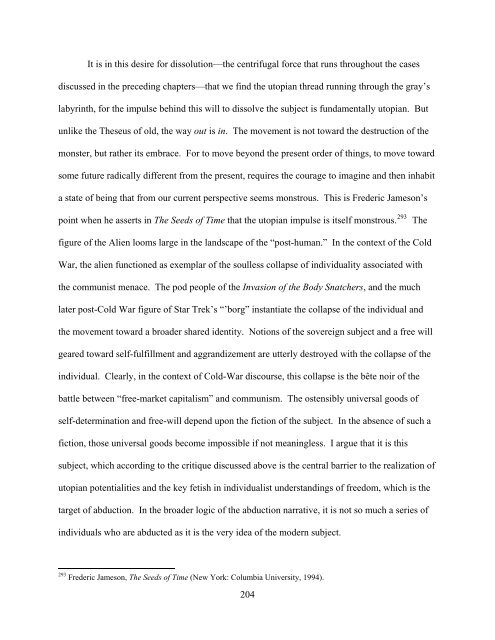A Genealogy of the Extraterrestrial in American Culture
A Genealogy of the Extraterrestrial in American Culture
A Genealogy of the Extraterrestrial in American Culture
Create successful ePaper yourself
Turn your PDF publications into a flip-book with our unique Google optimized e-Paper software.
It is <strong>in</strong> this desire for dissolution—<strong>the</strong> centrifugal force that runs throughout <strong>the</strong> cases<br />
discussed <strong>in</strong> <strong>the</strong> preced<strong>in</strong>g chapters—that we f<strong>in</strong>d <strong>the</strong> utopian thread runn<strong>in</strong>g through <strong>the</strong> gray’s<br />
labyr<strong>in</strong>th, for <strong>the</strong> impulse beh<strong>in</strong>d this will to dissolve <strong>the</strong> subject is fundamentally utopian. But<br />
unlike <strong>the</strong> Theseus <strong>of</strong> old, <strong>the</strong> way out is <strong>in</strong>. The movement is not toward <strong>the</strong> destruction <strong>of</strong> <strong>the</strong><br />
monster, but ra<strong>the</strong>r its embrace. For to move beyond <strong>the</strong> present order <strong>of</strong> th<strong>in</strong>gs, to move toward<br />
some future radically different from <strong>the</strong> present, requires <strong>the</strong> courage to imag<strong>in</strong>e and <strong>the</strong>n <strong>in</strong>habit<br />
a state <strong>of</strong> be<strong>in</strong>g that from our current perspective seems monstrous. This is Frederic Jameson’s<br />
po<strong>in</strong>t when he asserts <strong>in</strong> The Seeds <strong>of</strong> Time that <strong>the</strong> utopian impulse is itself monstrous. 293<br />
The<br />
figure <strong>of</strong> <strong>the</strong> Alien looms large <strong>in</strong> <strong>the</strong> landscape <strong>of</strong> <strong>the</strong> “post-human.” In <strong>the</strong> context <strong>of</strong> <strong>the</strong> Cold<br />
War, <strong>the</strong> alien functioned as exemplar <strong>of</strong> <strong>the</strong> soulless collapse <strong>of</strong> <strong>in</strong>dividuality associated with<br />
<strong>the</strong> communist menace. The pod people <strong>of</strong> <strong>the</strong> Invasion <strong>of</strong> <strong>the</strong> Body Snatchers, and <strong>the</strong> much<br />
later post-Cold War figure <strong>of</strong> Star Trek’s “’borg” <strong>in</strong>stantiate <strong>the</strong> collapse <strong>of</strong> <strong>the</strong> <strong>in</strong>dividual and<br />
<strong>the</strong> movement toward a broader shared identity. Notions <strong>of</strong> <strong>the</strong> sovereign subject and a free will<br />
geared toward self-fulfillment and aggrandizement are utterly destroyed with <strong>the</strong> collapse <strong>of</strong> <strong>the</strong><br />
<strong>in</strong>dividual. Clearly, <strong>in</strong> <strong>the</strong> context <strong>of</strong> Cold-War discourse, this collapse is <strong>the</strong> bête noir <strong>of</strong> <strong>the</strong><br />
battle between “free-market capitalism” and communism. The ostensibly universal goods <strong>of</strong><br />
self-determ<strong>in</strong>ation and free-will depend upon <strong>the</strong> fiction <strong>of</strong> <strong>the</strong> subject. In <strong>the</strong> absence <strong>of</strong> such a<br />
fiction, those universal goods become impossible if not mean<strong>in</strong>gless. I argue that it is this<br />
subject, which accord<strong>in</strong>g to <strong>the</strong> critique discussed above is <strong>the</strong> central barrier to <strong>the</strong> realization <strong>of</strong><br />
utopian potentialities and <strong>the</strong> key fetish <strong>in</strong> <strong>in</strong>dividualist understand<strong>in</strong>gs <strong>of</strong> freedom, which is <strong>the</strong><br />
target <strong>of</strong> abduction. In <strong>the</strong> broader logic <strong>of</strong> <strong>the</strong> abduction narrative, it is not so much a series <strong>of</strong><br />
<strong>in</strong>dividuals who are abducted as it is <strong>the</strong> very idea <strong>of</strong> <strong>the</strong> modern subject.<br />
293 Frederic Jameson, The Seeds <strong>of</strong> Time (New York: Columbia University, 1994).<br />
204















